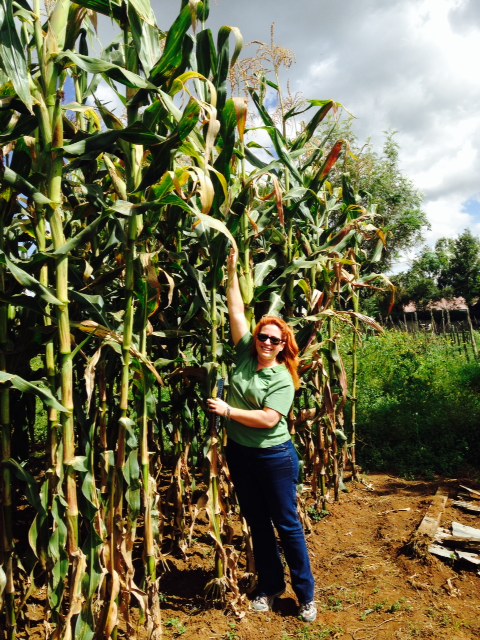You travel all over the world for your job. How do you explain what you do to your family?
Good question. My job title alone is complicated, much less trying to explain what I actually do. But in the end, it comes down to working with our teams in Africa, India and Asia Pacific to implement cutting-edge technologies that help us breed higher-performing hybrids for farmers faster than before.
Why do you think your work is important?
In the regions I work with, farmers regularly face tough conditions, like droughts and multiple diseases, which can reduce how much grain they produce. Since many of them can’t afford to manage their farms with all of the tools and products we have available in the U.S., they rely even more on the seed they plant to resist challenges and deliver a better harvest. And because they rely more on the seed, the work we do to deliver improvements can mean even more to their success.
How does your position contribute to helping feed a growing world?
To help people globally have access to a more balanced meal, and especially in our region which primarily consists of developing countries, I work on corn seed technology. That corn seed is part of an effort to support the growing demands of food and animal feed markets, as well as supporting the direct needs of farmers and their families. The improved performance we work to deliver in our hybrids, and the protection from weeds and insects we can help provide via biotechnology, directly contribute to meeting those demands in a sustainable way.
Why did this type of work interest you and how did you get started?
I had almost no exposure to production agriculture growing up in the New Jersey suburbs. My grandparents had extensive vegetable gardens, and I spent time in the summers of my youth helping to weed, pick, clean and can the produce from those gardens so that we could enjoy the taste of summer-fresh veggies in winter. I know how hard that work was. But I never saw agriculture as a viable job option until college.
My original plan was to become a small-animal veterinarian. But by majoring in Animal Science, I was thrown into the world of livestock production. It surprised, humbled and inspired me. I had no understanding of the challenges that farmers faced, nor the decades of research that have led us to our modern agricultural practices. In my first day of learning about the sciences of breeding and quantitative genetics, I was hooked. Becoming a part of the solution to help make agriculture better, more sustainable, more effective for our planet, and more secure for farmers, has been my life’s pursuit since then.
What has been your proudest moment while working at Monsanto?
That’s a tough question, because I am regularly amazed by the work of teams in many divisions of the company all over the world. Our people show incredible dedication to our customers, our communities, our children, and each other. And I’ve seen that commitment first-hand in the U.S., Brazil, India, Asia-Pacific and Africa. But the thing I may be most proud of is our increased commitment to communicate directly with people one-on-one. We know people have questions, and the answers aren’t always simple. I am encouraged as an employee to talk anywhere, anytime, with anyone who has questions about my work. And I’m quite happy to say that those opportunities for discussion pop up everywhere I go – in airports, hotels, on planes, in restaurants, etc.
When you’re not at work, what do you like to do in your spare time?
“Spare time” is a relative term, as any working mom will tell you. The truth is, I love being with my family. My husband and son are joys in my life. We are blessed to have great parents and friends that we see as often as we can. With a 5-year old at home, our time outside of work is heavily spent on outdoor family activities (the zoo, park, playground, pool, short hiking trips, etc.), but I spend a lot of my personal time as part of an organizing committee for a sarcoma research charity race, and as an officer in my local alumni chapter for my undergraduate university. My husband and I are working to restart swing dancing lessons. I love to go for drives in the country near the local wineries. And if you can get me to the water, I love to fish and swim.











